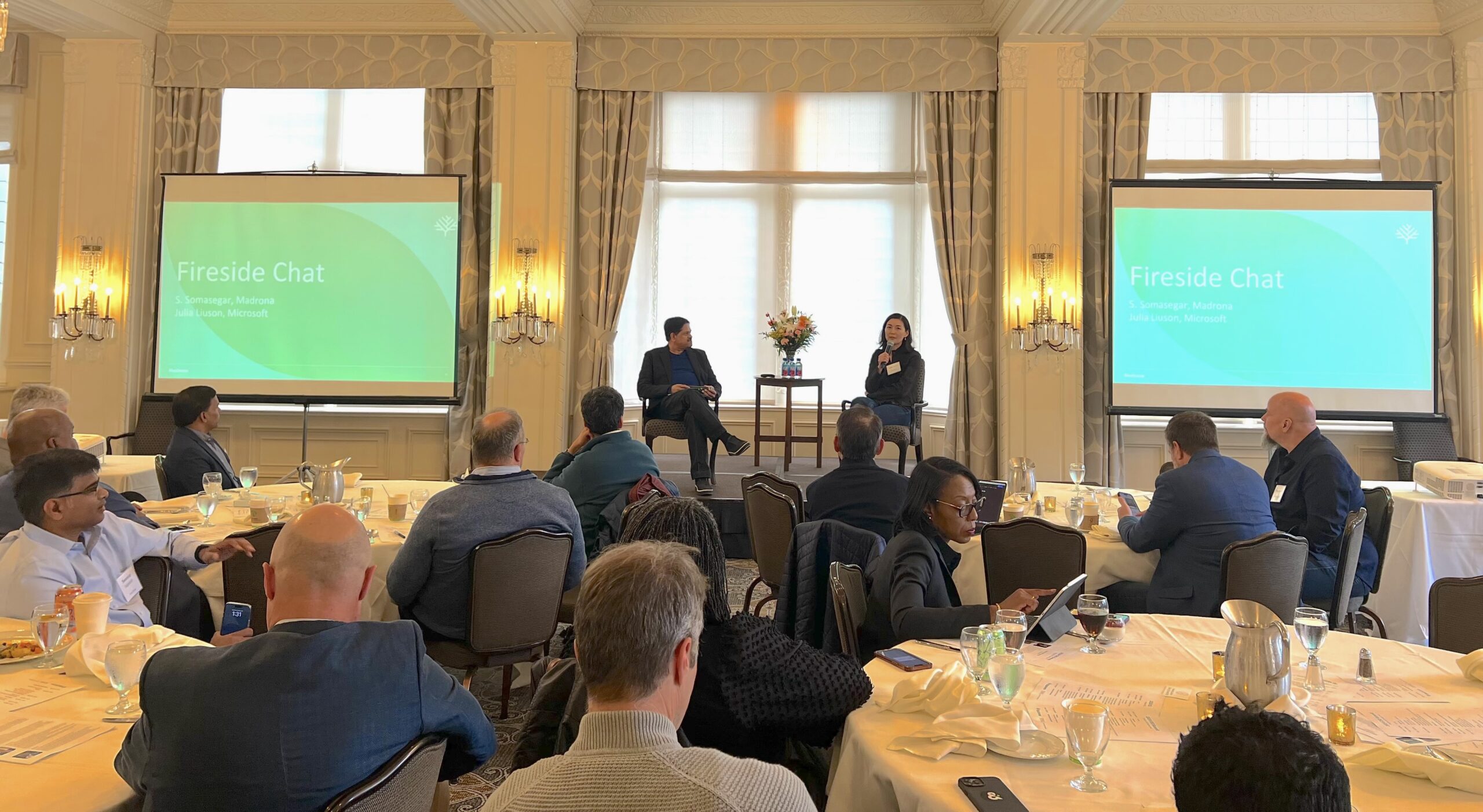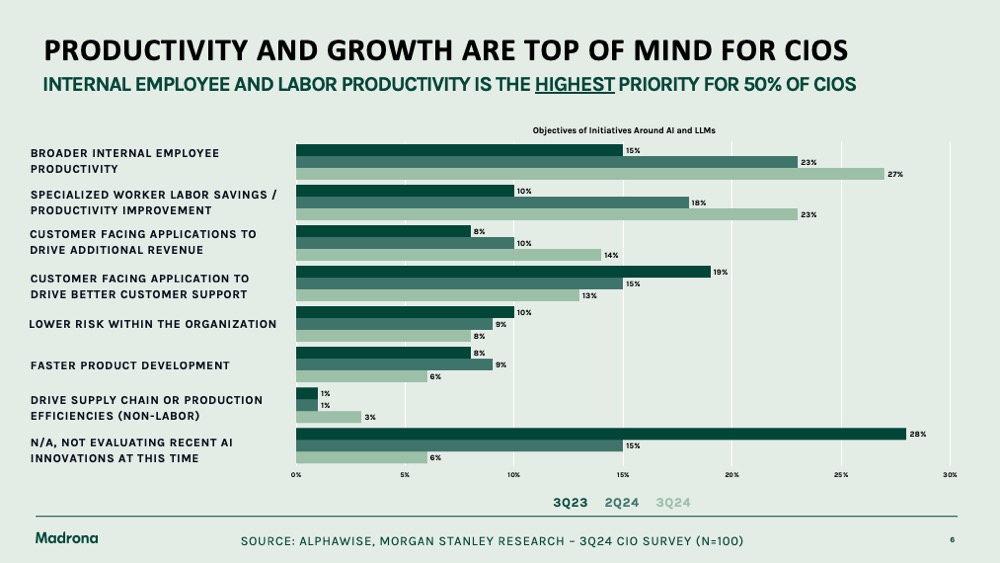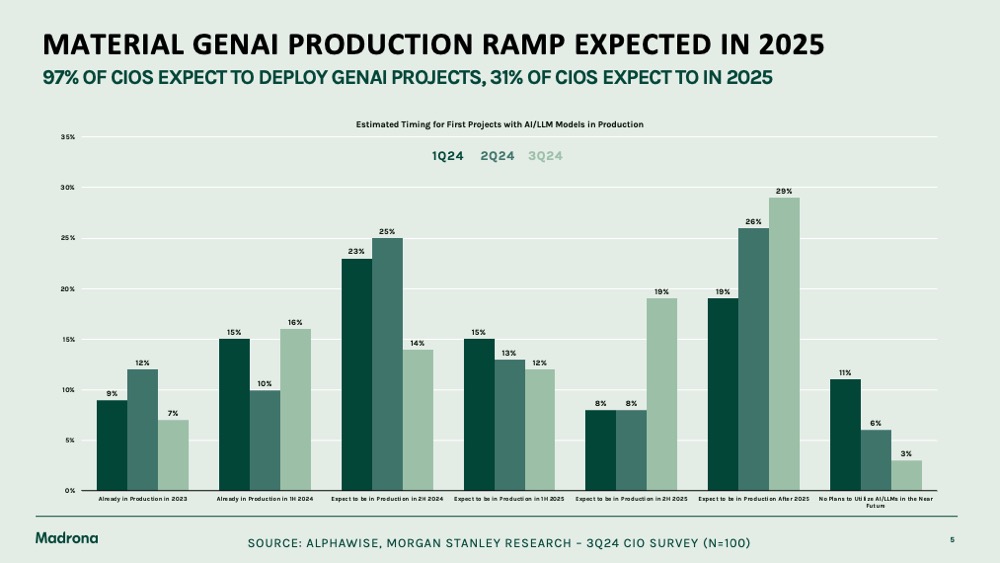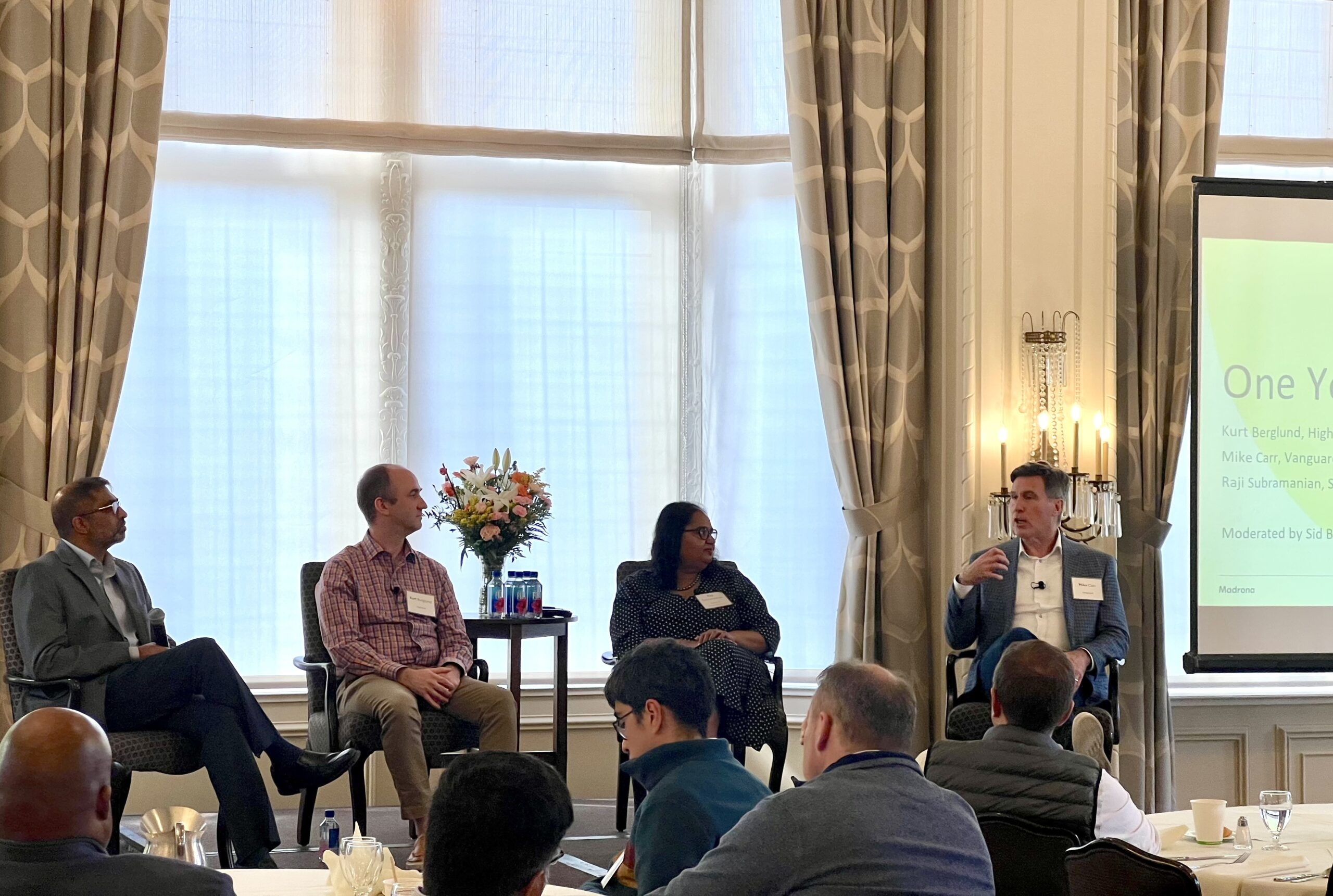AI is no longer just the future of work — it is reshaping the present at an unprecedented pace. Yet, as companies are moving beyond the hype, a critical challenge is emerging: How can they safely unlock AI’s full potential and transform promising experiments into core drivers of measurable business outcomes?
This was the central theme of Madrona’s annual CIO Summit, where top industry leaders, visionary thinkers, and innovative CIOs came together to explore AI’s evolving role in the enterprise. The discussions were rich with insights for CIOs and startup founders alike. The focus on real-world AI deployment, ROI, and the shift towards AI as a cornerstone of enterprise productivity holds valuable lessons for anyone navigating this space.
In this post, we unpack the five key takeaways from the 2024 CIO Summit from industry leaders such as Microsoft President of Developer Division Julia Liuson, Glean President of Product & Technology Tamar Yehoshua, and Amit Mital, who was most recently Special Assistant to the President and Senior Director at the National Security Council. We explore how enterprises are shifting AI from experimentation to essential use, addressing the ROI challenge amid economic pressures, embracing multimodal AI for enhanced productivity, navigating governance and trust issues, and the evolving role of CIOs as educators and enablers. Whether you’re leading a startup or driving innovation in a large enterprise, these insights provide a roadmap for anyone looking to leverage AI to drive competitive advantage and innovation.
Enterprise AI is shifting from experimentation to essential with workplace productivity top of mind
We are witnessing a shift in how CIOs view AI from experimentation to recognizing it as a core technology shaping the future of work. Compared to just one year ago, CIO interest in evaluating new AI innovations has grown rapidly from 72% to 94% of CIOs. Gone are the days when enterprises dabbled in AI solely for exploration; they are now seeking to create real value and define use cases that drive competitive advantage. When asked about primary areas for initial AI implementation, CIOs prioritize productivity suites (e.g., CoPilot, Zoom AI Companion) and customer service (e.g., agent assist, virtual agents) as the two primary areas of initial AI adoption today.
Consider companies like Confluent, an early adopter of Glean’s enterprise search capabilities, which leverages AI to improve employee productivity and elevate customer service experiences. They were able to unlock enterprise-wide information access across 20+ systems with usage by over 70% of employees. Other global companies are embracing AI for both internal productivity and customer-facing use cases, including Vanguard, an early adopter of Writer. Companies are moving from the speculative stage to integrating AI into mission-critical tasks — shifting from aspiration to application.
As CIOs re-evaluate technology roadmaps and prioritize AI investments that deliver tangible productivity gains, startups that offer practical, scalable AI applications stand to gain a significant foothold in enterprise markets. Founders should focus on building products that not only solve specific pain points but also fit into the broader trend of AI becoming essential to enterprise strategy.
AI adoption slows amid economic pressures, sharpening focus on ROI
As enterprises dive deeper into AI, the challenge of demonstrating ROI remains a fundamental question. CIOs expected to have more AI projects in production by H2 2024; these expectations have now shifted to ramp up in 2025 and beyond. In today’s economic climate, CIOs are facing pressure not only to innovate but also to provide tangible proof of value — especially when it comes to AI initiatives. The biggest points of friction for CIOs with AI are a lack of business use cases, high perceived costs, and unproven ROI, which have led to delays in project timelines.
Julia Liuson, President of Developer Division at Microsoft, shared how Microsoft has successfully demonstrated proof of value with customers. One standout example is Accenture’s use of GitHub Copilot, which yielded impressive results: 93% of suggested code was committed by developers, with an 84% increase in successful builds; 90% of developers also reported feeling more fulfilled. Raji Subramanian, a current stealth startup CEO and Former CTO at Opendoor, put it succinctly that AI is not only taking out the “drudgery” of work tasks, but can also now raise the ceiling of work to enable employees to channel their time in higher-impact projects.
For startups selling to enterprises, the ROI question becomes where they can create value and what unique experiences they can curate for customers. In a world where the quality of models is growing while the cost of running these models is dropping, we now see startups of all sizes capable of developing powerful AI tools for their customers. Success will come to those who not only innovate but also educate and guide enterprises through the complexities of AI adoption, positioning themselves as indispensable partners in the journey toward AI-driven transformation.
The future is multimodal — everyone will have personal AI assistants
The way we are interfacing with AI is transforming and reshaping how we imagine productivity in the workplace. Since ChatGPT made conversational AI mainstream, we have seen chatbots proliferate — but the future of user experience and interactions with AI agents continues to evolve beyond chat. There will be multiple winners serving enterprises with multimodal agents capable of responding to voice, text, and visual inputs, with AI as a true productivity partner.
Tamar Yehoshua, President of Product & Technology at Glean, emphasized that the possibilities for AI agents are endless. She described a future where AI assistants act proactively to address everything from company, department, to personal needs by completing tasks autonomously, retrieving insights across silos, and generating new content. This concept is more than a trend; it is a reimagining of how AI not only automates but also drives growth and innovation proactively.
Beyond companies like OpenAI, Glean, and Microsoft, we have seen a number of other AI applications successfully achieve scale. Madrona portfolio companies Runway and Typeface are leading the creation of GenAI content across modalities, while other companies like Perplexity are revolutionizing search. In the workplace productivity space, we have seen Harvey and Madrona-backed Read represent transformative workplace assistants amplifying workplace productivity.
As the paradigm for how we interact with AI shifts, we have also begun to see a shift from traditional business models to new AI-driven business models. AI is rewriting the SaaS playbook as companies explore outcome-based pricing, consumption-based pricing, and Service as Software models to reflect the new value they are providing customers.
Governance, security, and trust are key components of successful AI adoption
As companies lean into AI’s transformative potential, they face growing concerns around data privacy, ethical usage, and regulatory compliance. AI models trained on vast, diverse data require strict security controls to prevent breaches and maintain stakeholder trust. Without these safeguards, enterprises risk losing the trust of both customers and internal stakeholders, which can undermine AI adoption and stifle innovation.
Jessica Ferguson, CIO and Managing Director at JPMorgan Chase, emphasized the importance of embedding ethical guardrails and robust data privacy frameworks into AI initiatives. This not only reassures customers and teams but also positions the company as a responsible innovator. Successful AI adoption isn’t just about deploying advanced technology—it’s about ensuring that these solutions are secure, transparent, and trustworthy.
Mike Carr, CTO at Vanguard, pointed out the persistent gap in trust between human advisors and AI systems like robo-advisors. This highlights a critical challenge: for AI to achieve its full potential, companies must build systems that users trust as much as — or even more than — human counterparts. For enterprises and startups alike, prioritizing governance and trust isn’t just a compliance necessity; it’s a competitive differentiator that can determine the success or failure of AI deployment.
CIOs play a pivotal role in educating employees and customers in the era of AI
CIOs hold a multifaceted responsibility, acting as both strategists and educators within their organizations. They are tasked with not only identifying the right areas for AI investment but also ensuring that these solutions are effectively deployed to deliver meaningful outcomes. The “AI Security & Governance Panel” emphasized the importance of being realistic about enterprise readiness before piloting or purchasing new AI solutions — underscoring how preparation directly impacts the success and value derived from AI.
Because the success of AI adoption hinges as much on the human element as on the technology itself, CIOs are uniquely positioned to bridge differences between technical implementation and user acceptance. Kurt Bergland, VP of Engineering at Highspot, highlighted how there can be a gap between internal eagerness to adopt new AI technologies and external customer hesitance. CIOs play a crucial role in addressing these concerns, fostering trust and transparency, and ensuring that both employees and customers understand and embrace AI’s benefits.
In the broader organizational context, this educational role is vital. Empowering employees with the knowledge and tools to leverage AI effectively can lead to significant gains in productivity and innovation. For customers, clear communication and education about AI solutions help mitigate fears and build confidence in new technologies. By acting as the linchpin between technology and people, CIOs ensure that AI not only drives efficiency but also becomes a trusted, integral part of the business strategy.
In conclusion
The 2024 CIO Summit showcased just how far AI has come in reshaping the enterprise, from boosting productivity with intelligent copilots to redefining how businesses approach ROI, governance, and innovation. The days of cautious experimentation are behind us — it is no longer sufficient for CIOs to take the “wait and see” approach with AI. The focus now is on bold, strategic implementation.
For CIOs and founders alike, the message was clear: Those who embrace AI today will lead tomorrow. Whether it’s enhancing workplace efficiency, creating new customer experiences, or building trust in AI-driven solutions, the potential is enormous — but only for those willing to act decisively.
We left the Summit energized by the shared sense of urgency and possibility. AI is not a distant horizon; it is the competitive edge shaping the present. Thank you to all the remarkable participants who shared their insights and expertise. We are excited to see how these ideas take shape in the year ahead, and we look forward to reconvening next year to explore the next frontier of enterprise AI.



